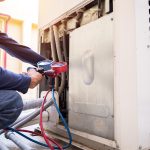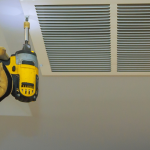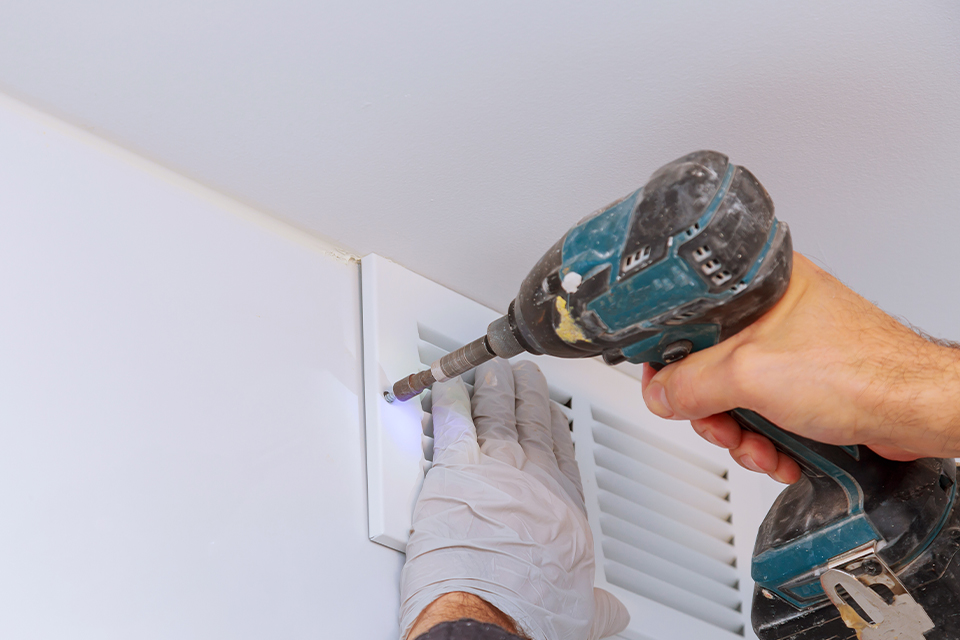
How Do Air Conditioners Work
July 28, 2025
How Does Ducted Heating Work
September 17, 2025Converting Gas Ducted Heating to Electric

Converting gas ducted heating to electric is becoming increasingly popular with gas prices rising, the desire for energy efficiency and government incentives. Gas ducted heating cannot be directly converted to electric but you can replace the unit with an electric system. Read on to discover what gas ducted heating and electric heating is, the differences between the two, how to convert gas ducted heating to electric and the benefits of converting gas ducted heating to electric.
What is Gas Ducted Heating?
Gas ducted heating is a heating system that uses natural gas to warm the air and distribute it through ducts in the home. This type of heating system has one single central heating unit that is usually installed outside the house or in the roof space. The central heating unit is connected to the rooms in the house via a series of ducts. To heat the home, interior air is drawn in by a fan to the central heating unit where it is heated and then released through the ducts into the home.

Pros and Cons of Gas Ducted Heating
As one of the more traditional methods of heating, gas ducted heating has both advantages and disadvantages, particularly in light of technological advances and increasing energy efficiency of alternative heating methods. The pros and cons of gas ducted heating are:
Pros of gas ducted heating
- Efficient and quick: Gas ducted heating systems are efficient and quick. The system heats the air quickly in the central heating unit and distributes it efficiently through ducts to the rooms.
- Zoning options: The zoning in gas ducted heating means you can choose which rooms or zones the heat goes into which is ideal for comfort and energy efficiency.
- Whole home heating: Gas ducted heating has ducts that can supply heat to a whole home so every room will be kept comfortable during the cold months.
Cons of gas ducted heating
- Potential carbon monoxide poisoning: Gas ducted heaters that are not properly maintained, faulty or damaged can potentially lead to carbon monoxide poisoning.
- Lack of cooling: Gas ducted heating is purely a heating source and cannot provide cooling.
- Not a sustainable option: Gas ducted healing is considered a less sustainable option than other heating methods because it burns fossil fuels that contribute to greenhouse emissions and climate change.
- Energy loss: These heating systems can experience energy loss through the ductwork. Older ducts can develop leaks which lead to energy loss in spaces like the wall cavities or roof.
- Gas availability: Natural gas availability varies by location and it is likely to become less available with the move towards utilising natural resources like solar and wind.
- Higher ongoing running costs: Gas ducted heating typically has higher running costs than electric ducted heating.
What is Electric Ducted Heating?
Electric ducted heating is a heating unit that uses electricity to provide heated air that is then distributed through vents in the home. The most common type of electric ducted heating is reverse heating and cooling because it is a highly efficient way of heating and cooling in a single system. Electric ducted heating consists of a central unit that uses electricity to heat and cool the air that is distributed via ducts. Electric ducted systems work by using a heat pump to transfer heat between the indoor and outdoor environments, providing both cooling and heating modes.
Pros and Cons of Electric Ducted Heating
Modern electric ducted heating systems are becoming more popular as technology consistently improves. Electric ducted heating offers long term savings, environmental benefits and improved safety. However, it can have a downside with potentially higher upfront costs. The pros and cons of electric ducted heating are:
Pros of electric ducted heating
- Energy efficiency: Electric ducted heating systems, particularly reverse cycle, are energy efficient. They transfer heat rather than generate it, making it efficient for heating and cooling while using less energy.
- Lower upfront costs: Electric ducted heating costs less to install than gas ducted heating because it requires fewer components and doesn’t need gas connections, exhaust systems, or ventilation. The additional rebates also keep costs to a minimum when setting up an electric ducted system.
- Quiet operation: Electric ducted heating, particularly reverse cycle is one of the quietest types of heating and cooling systems. Features like advanced inverter technology, efficient indoor fans, and noise-reducing designs all contribute to the noise reduction.
- Comfort:The heating and cooling of a ducted system means you get year round comfort.
- Zoning: You can get reverse cycle heating and cooling that is zoned into different rooms.
- Solar possibility: With the installation of solar panels, an electric ducted system can run purely from the energy source created by the solar panels.
- Lower ongoing running costs: Reverse cycle ducted electric heating is far cheaper to run than gas ducted heating.
Cons of electric ducted heating
- Dependence on electricity: Electric ducted heating is dependent on the availability of electricity to operate, which makes them vulnerable to power outages.
- Limited flexibility: Electric ducted systems can be less flexible than other systems in terms of temperature control to individual rooms.
- Expensive to install: Electric ducted heating can be quite expensive to install, sometimes even more expensive than ducted heating. However the long term savings often make up for the initial upfront costs.
Differences between Gas Ducted And Electric Ducted Heating
Understanding the differences between gas ducted and electric ducted heating is important for making and informed choice on whether to convert your system. The following table displays the comparison between gas ducted and electric ducted heating.
| Gas Ducted Heating | Electric Ducted Heating |
| The source of energy is natural gas. | The source of energy is electricity. |
| Uses ducts to provide air. | Uses ducts to provide air. |
| Installation can be complicated | Installation can be complicated |
| Higher operational costs in areas where rates of natural gas are higher. | Usually, electricity prices are higher, but electric heating systems are energy efficient, greatly reducing operational costs. |
| Higher maintenance needed. | Lower maintenance requirements. |
| Environmental impact because of green gas emissions. | Almost zero environmental impact when not using non-renewable resources. |
| Efficient in cold temperatures as it heats quickly. | Takes longer to heat and so better for moderate temperatures. |
What to Consider When Deciding on Converting Gas Ducted Heating to Electric
There are a plethora of reasons for converting from gas ducted heating to electric with everything from energy efficiency to government rebates. When considering whether to convert from gas ducted heating to electric you need to weigh up the cost to convert, long term benefits and the availability of government incentives. Some things to consider to help make an informed decision are:
- Energy needs: In order to understand your energy needs, evaluate your existing system to see if it has met your heating requirements. If it has, you will know your energy needs can be met with an electric ducted system of a similar power. If the energy needs were not met by the current system, you will need to consider investing in a larger size.
- Costs: When considering how much it will cost, you need to take into account the upfront cost of conversion and ongoing costs. The ongoing costs include maintenance and energy bills. While gas may be slightly cheaper to install, the overall running costs are less in electric systems due to the increased energy efficiency. While gas typically costs less megajoules of energy than the kilowatts electricity uses, the higher efficiency of electric units makes them more cost effective.
- Environmental considerations: When considering the environment, take into account the impact of converting to an energy efficient heating system. An electric system produces reduced emissions than gas systems which contributes to a cleaner environment. Electric systems can also be powered by renewable resources like solar panels which further reduces the carbon footprint.
Government Rebates
Research the availability of rebates for switching from gas ducted heating to electric ducted heating. In Victoria, the Victorian Energy Upgrade (VEU) offers rebates that can considerably reduce the cost of converting from gas ducted heating to electric ducted heating. The VEU offers financial incentives for those converting to more energy efficient heating systems. The amount of the rebate depends on the specific system and installation costs but it can significantly reduce the cost of conversion.

How to Convert Gas Ducted Heating to Electric
Converting gas ducted heating to electric ducted heating usually involves replacing the gas ducted heating unit with an electric reverse cycle heating system. In order to convert gas ducted heating to electric, these steps are involved.
- Consult with professionals: Simply Air is a reputable heating and cooling specialist to ask for advice on how to convert your current gas ducted heating system to electric. The professional team will be able to determine the best solution for your needs and are certified to install an energy efficient heating and cooling systems that can be processed under the VEU program.
- Remove gas ducted heating system: The gas ducted heater will be professionally decommissioned by a qualified gas engineer to disconnect the heater and gas lines.
- Install the new electric ducted system: A professional heating and cooling specialist at Simply Air will install the electric ducted system which will include an indoor and outdoor unit. The original gas ductwork will need to be modified and replaced if necessary. New wiring will have to be installed to ensure the system operates safely, and a new thermostat and control system will be installed potentially with wifi settings.
- Apply for rebates: If rebates are available, the provider will apply for the rebate on your behalf.
Benefits of Converting Gas Ducted Heating to Electric Ducted Heating
There are a number of benefits for converting from gas ducted heating to electric ducted heating which is why it has become so popular. These include:
- Increased energy efficiency: Reverse cycle ducted heating and cooling is the most energy efficient form of heating.
- Improved air quality: Converting from gas to reverse cycle improves air quality as it filters out dust and other air pollutants through the built-in filters.
- Financial benefits: When taking into account potential rebates and energy saving costs, converting to reverse cycle ducted systems has a plethora of financial benefits.
- Environmental impact: Electric heating is better for the environment, particularly if utilising natural resources like solar power to produce it.
Is Converting To Gas Ducted Heating to Electric Essential?
It is no longer essential to convert gas ducted heating to electricity since the government recently revised its plan to phase out gas appliances. However, converting from gas ducted heating to electric remains a popular choice given the plethora of benefits, including lower energy bills, reduced environmental impact and better air quality.
Gas ducted heating can be converted to electric by replacing it with an electric system which is usually a reverse cycle system. In this article we have guided you through the differences between gas ducted heating and electric ducted heating, how to convert from one to the other, and what to consider when deciding. For further information the experts at Simply Air are available to answer any questions.
 Schedule a quote
Request a callback
Schedule a quote
Request a callback

Call us Mon-Fri: 8:30am-5pm or leave us a message for a callback.
